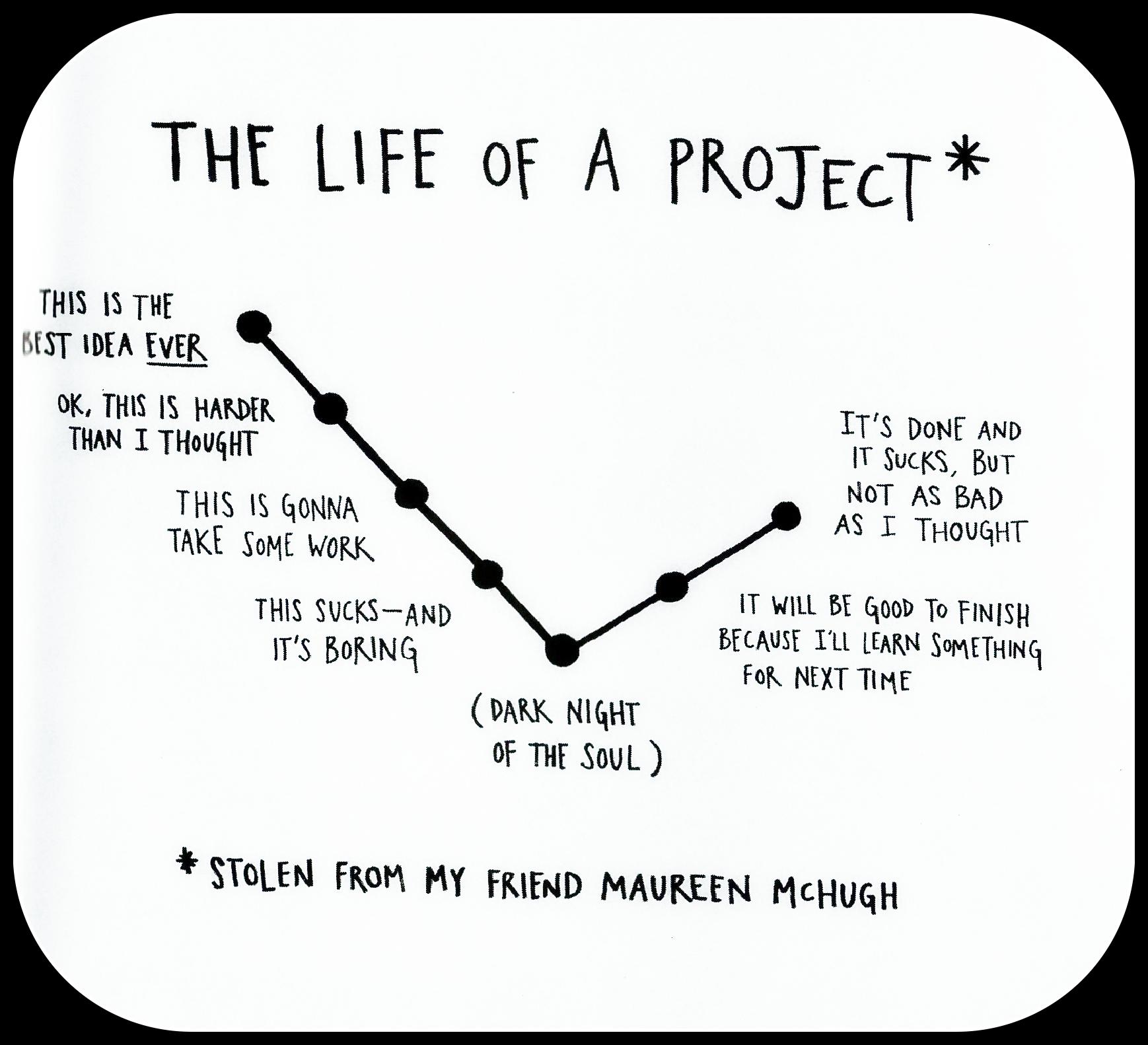[4 minute psychology]
“Thanks Rebecca, now I feel like less of a Ph.D. fuck up”.
The ex-doctoral student was responding to my congratulations on his job promotion.
He hadn’t completed his Ph.D.
I wish everyone had a Ph.D.
Then everyone would realize a Ph.D. doesn’t fix you.
A Ph.D. can’t make you ‘good enough’
If it did fix you, if it did make you good enough, I wouldn’t be mounting the stairs to my office with the familiar dread mounting in my gut with every step.
Because, in my office is a draft of my first popular psychology book.
“It’s never going to be finished”
The chorus of my ‘inner critic’ is deafening. The lyrics go:
No matter how long and hard you work on this, it’s never going to be finished and it’s never going to be good enough
I had that ringing in my ears though the four years of my Ph.D. The survival routine of those final thesis write-up days started with a coffee, followed by 20 minutes of reading a Brené Brown book, then 20 minutes of emotional disclosure journaling – stabbing and gouging the paper with my pen, rounded off with ugly crying.
Then I sat at my computer – where my Ph.D. thesis lurked – feeling gut sick. I felt like I was walking into an execution chamber and strapping myself into the electric chair.
I was terrified of my thesis
I had developed a thesis-phobia. My thesis had become an aversive object of criticism, pain, and failure.
However, despite being convinced I couldn’t finish my thesis, I worked on it anyway.
It took the application of brutal, exhausting willpower. But – lo and behold – my Ph.D. thesis was finished, and it was good enough.
My inner critic was a $6000 liar
$6000 worth of good enough – the amount my university awarded me for submitting a timely, quality thesis.
I’m proud of my thesis, and I’m proud of myself for finishing it. But, I’m not ‘fixed’. I still struggle with procrastination, fear and anxiety.
However, I am better at managing my inner critic – at managing the overwhelm.
Finishing the unfinishable
And that is the true gift of my Ph.D. The gift of completing something I believed I couldn’t.
The gift is knowing that the feelings of panic, stress, and overwhelm – the conviction that I can’t do it. Simply. Aren’t. True.
Not only is it untrue, overwhelm is usually an indicator of the exact opposite. That I am heading into bold new territory. The edges of the map – where dragons lie. Which is exactly where I’m headed.
The procrastination-inducing overwhelm is ‘just’ our inner critic trying to keep us in the middle of the herd. Safety in numbers. Don’t stand out.
Protection from failure
Our inner critic works overtime to prevent us being picked off by modern day predators. Ridicule. Failure. Rejection.
But beyond the herd, beyond the edges of the map, is where the dragons are minding your gold.
Successful people – those living their dreams – typically have a different take on failure, rejection, ridicule, and overwhelm, from people not yet living their dreams.
Wildly successful writer Elizabeth Gilbert (Eat, Pray, Love: Big Magic) sees this ‘difference’ as something that sorts the professionals from the amateurs.
How amateurs react to overwhelm
Unlike professionals, amateurs give up when the going gets tough. Beautifully captured in Maureen McHugh and Austin Kleon’s infographic below – hitting the long dark night of a project’s soul is normal. But amateurs don’t understand this. They think ‘tough’, ‘difficult’ and ‘overwhelm’ is painful proof they can’t do it.
Amateurs don’t differentiate between themselves and their output. They think if they fail, then they are a failure. When their work is rejected, they feel like rejects. When their work is criticized, it feels like harsh personal criticism. When they do receive harsh personal criticism, the pain urges them to either lash out in anger or curl up and die.

Procrastination whispers “Just give up – it’s easier”
Given how excruciatingly painful amateurs find overwhelm, criticism, and failure, it makes sense to procrastinate. The sub-text of procrastination is: “If you don’t try, you can’t fail”.
The only thing worse that an ugly suspicion you aren’t good enough, is having that suspicion confirmed.
In contrast, professionals know they are not their output. They push through the overwhelm. They see it as possible evidence they are heading for gold, rather than evidence they can’t do it.
They know there are days where good work feels overwhelming, boring, or impossible. (They also know there are days where good work feels fast, easy and fun.)
Buy tickets in the success lottery
Professionals know pushing through overwhelm is not a guarantee of success, but you have to be in to win.
Professionals know every failure, every criticism, every rejection, is yet another gold ticket in the success lottery.
As a recovering amateur and practicing professional, I want you to know this, too.
To be clear, the difference between ‘professionals’ and ‘amateurs’ is a mindset. A learned mindset, not some fixed genetic luck-of-the-draw characteristic.
Fortunately, there’s a range of strategies for swapping the mindset of an amateur for that of a professional. For example, writer Kim Liao acquired a professional comfort with failure, by aiming for 100 rejections in a year.
My 3 top tactics for navigating overwhelm
1.The critical, number one, overwhelm-busting strategy is to be mindful of what ‘overwhelm’ really is – and what it isn’t.
Overwhelm isn’t proof that you can’t do it. It’s only true if you listen to the lie.
Overwhelm is your inner critic doing its misguided best to protect you from life-threatening criticism, failure, and rejection.
2. Even when you know overwhelm isn’t ‘true’, it can still be overwhelming.
This tactic involves breaking the task into small, less-overwhelmy components:
i/ Put a timer on for five minutes and quickly map out the key components of the task.
ii/ Next, pick one of these components of the task – any one.
3. Noticed how getting started is often the hardest part?
Fortunately it just takes a few minutes to break the inertia of the procrastination barrier.
Again, set the timer for a tiny, non-overwhelmy amount of time – 10 minutes, or even just a friendly 5 minutes – then just work on the component you selected in point 2 until the timer goes off.
I won’t lie to you – pushing through overwhelm isn’t easy. But there are ways of making it easier and my Ph.D. is proof it’s possible.
I promise you it gets easier with practice.
I don’t care that my former colleague didn’t finish his Ph.D. But I am sad he’s been denied discovering a Ph.D. can’t fix him.
Because only he can do that – by realizing there is nothing wrong with him. And there never was.
Comment below: It would be awesome if you shared your struggles and triumphs with overwhelm and procrastination below. I know I’m not the only one – and we are only as sick as our secrets.
FREE download “How to safely use a dangerous – but powerful – psychology strategy to finish anything” How do you think I finished my Ph.D. thesis on time? This strategy is the big gun of behavior psychology. It provides powerful motivation – but can backfire if applied incorrectly. Subscribe and download the FREE step by step instructions and start finishing! Click here to subscribe and get the free behavior psychology strategy for finishing anything
Share: Be a hero the easy way! If you think others will find this article mildly interesting/slightly funny/quite moving/not too boring, then please share on Facebook, LinkedIn, Google+, and/or Twitter, using the social media buttons above and below this blog post.
Further Reading:
[1 minute psychology] There’s no such thing as laziness – the REAL cause of procrastination (it’s not what you think)
Procrastination is a phobia – and can be treated like one – arachnophobia is a fear of spiders, procrastination is a fear of failure. The good news is that psychology strategies used to treat stereotypical phobias can also treat procrastination.
The 10 minute trick for beating procrastination – Helping with the hardest part – getting started.







Dana
Oh my god I love your blog, you’re wonderful with words and humourous too!